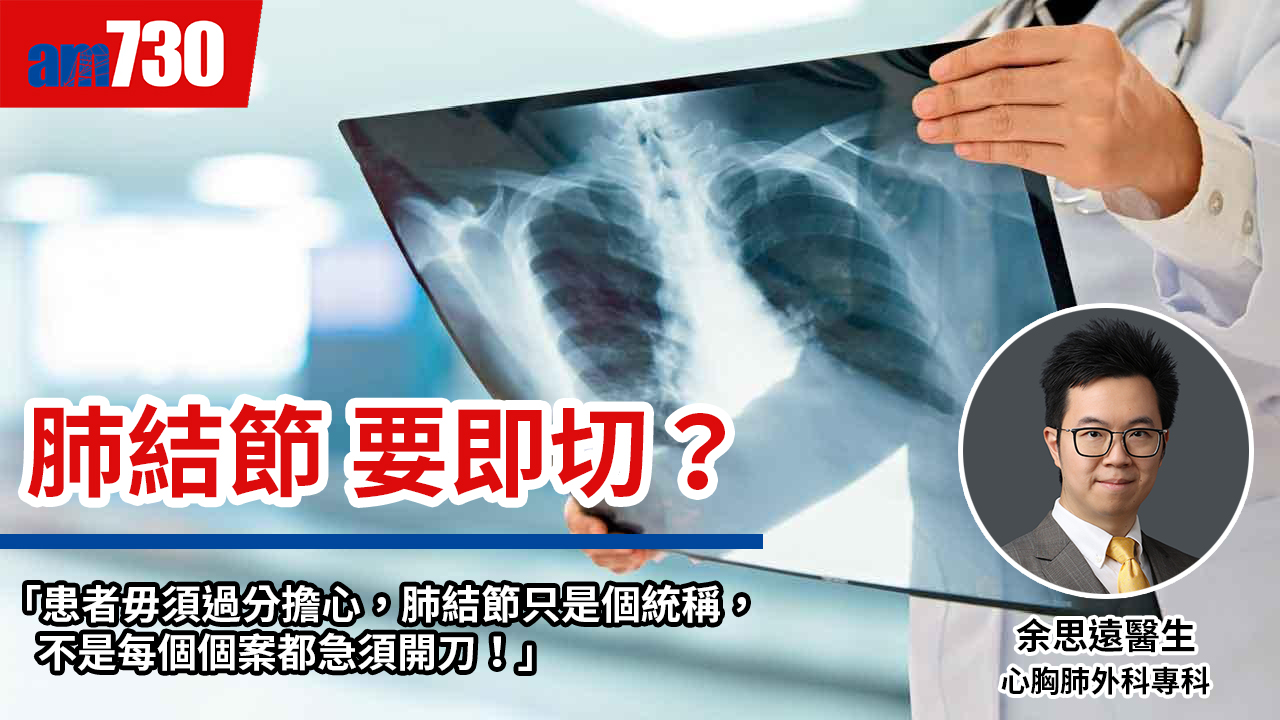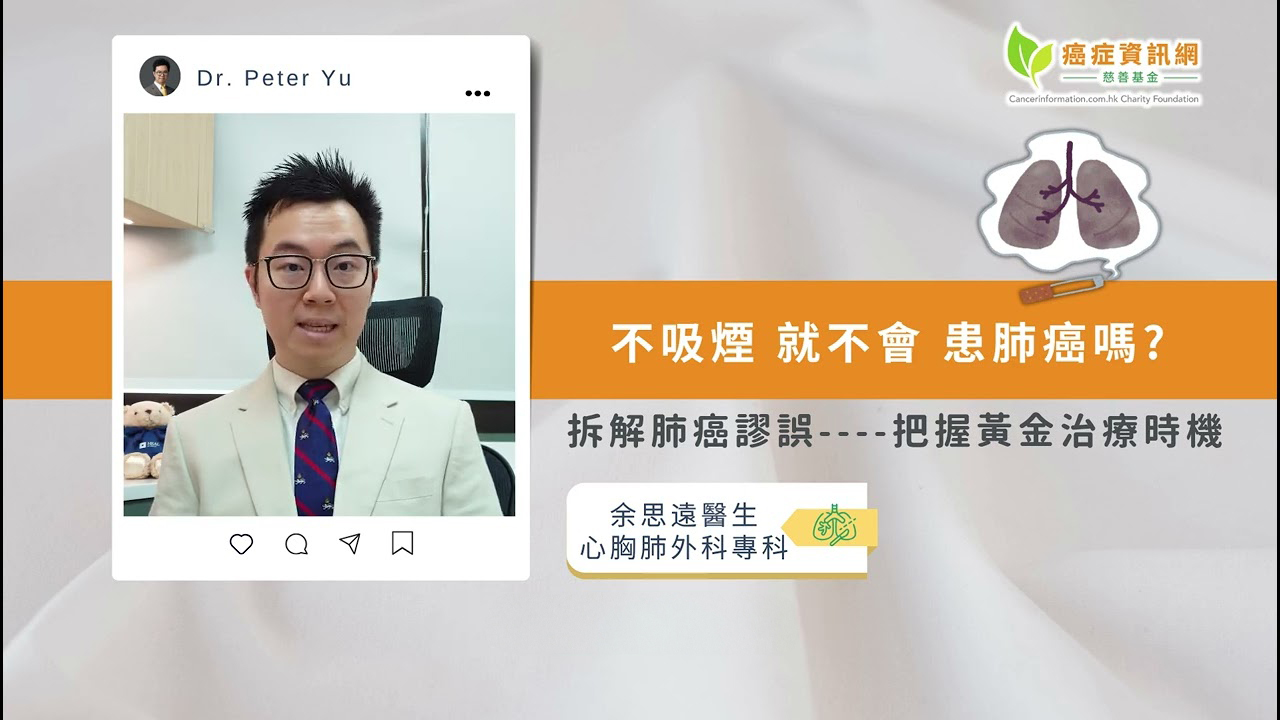
Dr YU Sze Yuen
Specialist in Cardio-thoracic Surgery
Clinical Assistant Professor (Honorary), Faculty of Medicine, CUHK
Qualification
- MB BS (HK)
- FRCSEd
- FCSHK
- FHKAM (Surgery)
Scope of Services
- Lung Cancer
- Pulmonary Nodule
- Chest Wall Tumour
- Mediastinal Mass
- Pneumothorax
- Pleural Effusion
- Pneumonia / Pulmonary Tuberculosis
- Respiratory Failure
- Therapeutic Bronchoscopy
- Myasthenia Gravis
- Traumatic Rib Fracture
- Palmar Hyperhidrosis
- Pericardial Effusion
- Pulmonary Sequestration
Admission Rights
Related Services
Chest Wall Tumours
Cardio-thoracic SurgeryClinical OncologyPlastic Surgery
Complete resection of a chest wall tumour may require the removal of the overlying skin, muscle layers, and ribs and may necessitate reconstruction of the chest wall using autologous tissue or prosthetic materials to preserve its shape and function.
Detail
Lung Cancer
Cardio-thoracic SurgeryClinical OncologyRespiratory Medicine
Lung cancer is known as the "number one killer" among cancers in Hong Kong. Early diagnosis can significantly improve the cure rate of lung cancer. However, patients often discover lung cancer at the mid or late stage, missing the optimal treatment window.
Detail
Lung Nodule
Cardio-thoracic SurgeryRespiratory Medicine
Lung nodules refer to localized shadows or masses in the lungs with a diameter of less than 3 cm. “Lung nodules” per se is not a disease name. They are often asymptomatic and are usually discovered incidentally during health check-ups or imaging studies. The management of lung nodules is highly individualized. If you discover that you have lung nodules, do not panic. It is advisable to seek assistance from a specialist for evaluation and management as soon as possible.
Detail
Mediastinal Masses
Cardio-thoracic SurgeryClinical Oncology
Possible causes of Mediastinal Masses include lymph node enlargement (resulting from infections, inflammation, autoimmune diseases, or malignant tumours), tumours (such as thymoma, germ cell tumours, and schwannomas), cysts, or other diseases.
Detail
Pleural Effusion
Cardio-thoracic SurgeryRespiratory Medicine
Pleural effusion refers to an abnormal buildup of fluid in the pleural cavity. Under normal circumstances, the pleural cavity contains only a small amount of fluid (about 10-20 ml) to lubricate the pleura during respiratory movements. When the fluid volume increases abnormally, it can compress lung tissues, potentially leading to breathing difficulties, chest pain, and other respiratory symptoms.
Detail
Pneumonia / Tuberculosis
Cardio-thoracic SurgeryRespiratory Medicine
Pneumonia is a lung infection that bacteria, viruses, or other pathogens may cause. Tuberculosis (TB) is a pulmonary infection transmitted through tiny droplets released when an infected person coughs or sneezes. Treatment for pneumonia and tuberculosis primarily involves medical management. However, a small number of patients may require surgical intervention to assist with diagnosis or to manage disease-related complications, such as pleural effusion/empyema or poor lung re-expansion.
Detail
Respiratory Failure
Cardio-thoracic SurgeryRespiratory Medicine
Respiratory failure occurs when the lungs cannot adequately fulfill their essential function of supplying oxygen to the body and removing carbon dioxide. It can be caused by various factors such as lung diseases, infections, injuries, or even certain medications.
Detail
Therapeutic Bronchoscopy
Cardio-thoracic SurgeryRespiratory Medicine
Therapeutic bronchoscopy is a medical procedure that uses a flexible or rigid bronchoscope to diagnose and treat respiratory system diseases.
Detail
Myasthenia Gravis
Cardio-thoracic SurgeryNeurology
Myasthenia Gravis (MG) is a chronic autoimmune disorder characterized by impaired communication between nerves and muscles, resulting in muscle weakness and fatigue. MG can affect any muscle in the body but commonly targets muscles controlling the eyes, face, swallowing, and breathing. Severe cases can be life-threatening.
Detail
Palmar Hyperhidrosis
Cardio-thoracic Surgery
Palmar Hyperhidrosis is caused by an abnormality of the sympathetic nervous system that regulates sweat secretion, leading to sweating of the palms even when it is not needed. When severe, this condition can interfere with daily tasks and social activities. Video-assisted thoracoscopic surgery (VATS) can rapidly relieve symptoms by removing the affected sympathetic nerves.
Detail
Pulmonary Sequestration
Cardio-thoracic SurgeryPaediatricsPaediatric Surgery
Pulmonary sequestration is a rare congenital lung anomaly, characterized by a portion of lung tissue that does not connect to the normal bronchial tree and receives its blood supply from the systemic circulation (e.g., aorta) rather than the pulmonary arteries. This sequestered lung tissue is non-functioning and prone to infection or abscess formation.
Detail
Pericardial Effusion
Cardio-thoracic Surgery
Pericardial effusion refers to the abnormal accumulation of fluid in this space. If the fluid accumulates excessively or rapidly, it can compress the heart and lead to a life-threatening condition called cardiac tamponade.
Detail
Related Articles

Medical check-up reveals "lung nodules" = lung cancer? Stay calm! A complete breakdown of 3 major categories + risk classification

Non-Smokers Get Lung Cancer Too! Early Detection Saves Lives

Pneumothorax Myths Busted! Don't Miss These Critical Symptoms

【Struggling with Sweaty Hands? 】Your Comprehensive Treatment Roadmap








